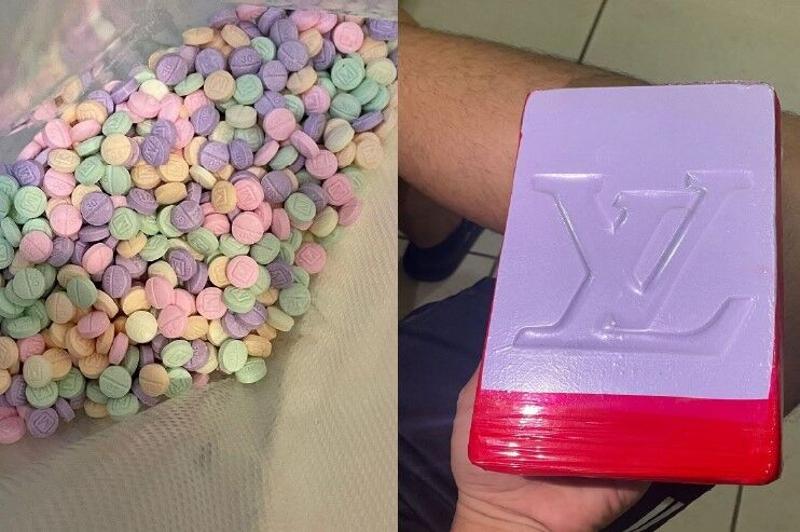U.S. officials are using a new tool to go after the leaders of a cartel accused of “aggressive” fentanyl trafficking across the border over the last two decades.
The leaders charged in the first-of-its-kind indictment remain at large. They could spend decades in prison if captured and convicted of narco-terrorism. But for now, the new tool remains untested.
Craig Deare, a professor at National Defense University, said cartels no longer limit themselves solely to drug trafficking. Instead, they have become transnational criminal organizations engaged in everything that makes money, including drug trafficking, money laundering and weapons trafficking. He said the foreign terrorist organization designation could help.
“It’s just another tool in this administration’s toolbox,” he said during a recent webinar hosted by the Mexico Institute and the Wilson Center’s Canada Institute. “And like any tool, it can be employed well to great effect or it can be abused.”
Cecilia Farfán-Méndez, a researcher at the Institute on Global Conflict and Cooperation at UC San Diego, said fentanyl, like automobiles, crosses the U.S.-Mexico border multiple times before it gets to the consumer. She compared fentanyl to cars made in North America – some manufacturing is done in Mexico and some is done in the U.S.
“What we’re seeing with fentanyl is similar, in what I would call a very North American product,” she said. “So unlike cocaine and heroin, which are produced in Point A and trafficked to Point B, what we are seeing with fentanyl is essentially pre-precursors and precursors crossing the border multiple times before it reaches the final consumer.”
She said fentanyl production is a transnational activity, not a problem limited to Mexico.
On Tuesday, federal prosecutors charged alleged Sinaloa Cartel leaders with narco-terrorism and material support of terrorism for trafficking fentanyl, cocaine, methamphetamine and heroin into the United States. It was the first time prosecutors charged alleged drug traffickers with terrorism-related charges. Prosecutors charged Pedro Inzunza Noriega and his son, Pedro Inzunza Coronel, with narco-terrorism, drug trafficking and money laundering as key leaders of the Beltran Leyva Organization, a faction of the Sinaloa Cartel that is believed to be the world’s largest known fentanyl production network, according to the Justice Department.
More than a decade ago, prosecutors alleged the Flores Crew of the Beltran Leyva Organization was moving between 1,500 and 2,000 kilograms of cocaine a month through its Chicago-based operations in a 2009 indictment. In the more recent indictment, prosecutors said cartel leaders – including Pedro Inunza Noriega and his son Pedro Inzunza Coronel – switched to fentanyl as America’s appetite for opioids expanded. They moved to “aggressively traffic fentanyl to the United States,” according to prosecutors.
“Together they lead one of the largest and most sophisticated fentanyl production networks in the world,” prosecutors alleged in the new indictment. “Over the past several years, they have trafficked tens of thousands of kilograms of fentanyl into the United States.”
Prosecutors pointed to a December 2024 bust in Mexico where authorities raided multiple locations in Sinaloa controlled by the father and son duo and seized about 3,300 pounds of fentanyl in the largest fentanyl seizure in the world.
Prosecutors also charged five other BLO leaders with drug trafficking and money laundering. The leaders have been on U.S. sanctions lists for years after being sanctioned by U.S. Department of the Treasury’s Office of Foreign Assets Control in December 2023. Officials noted at that time that “the opioid epidemic, as well as the evolving landscape of illicit drug trafficking, has further emboldened the BLO to take advantage of the lucrative market for illicit fentanyl in communities across the United States.”
The fresh indictment comes after President Donald Trump signed an executive order that designated the Sinaloa Cartel as a Foreign Terrorist Organization in February.
U.S. Attorney Adam Gordon, of the Southern District of California, compared the leaders to cancer.
“They metastasize violence, corruption and fear. If left unchecked, their growth would lead to the death of law and order,” he said. “This indictment is what justice looks like when the full measure of the Department of Justice along with its law enforcement partners is brought to bear against the Sinaloa Cartel.”







